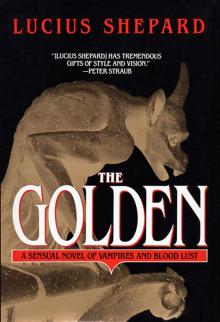- Home
- Lucius Shepard
The Golden Page 2
The Golden Read online
Page 2
“Let me go,” Beheim said. “I’m all right. Let me go.”
Reluctantly, it seemed, Agenor released him.
Beheim adjusted the hang of his evening clothes, rumpled during the struggle, and glared with unalloyed hatred at Lady Dolores. For a second she appeared unequal to his stare, uncertainty clouding her face, but she quickly regained her composure.
“Surely you don’t wish to challenge me?” she said in a mocking voice.
“What I wish and what I must do in order to conform to tradition are two different matters,” said Beheim. “But I swear to you, lady, you’ll regret this night.”
Several members of the Cascarin branch moved closer to her, ready to take her part, and behind Beheim, others of the Agenor branch assumed a like posture.
“Consider carefully, cousin,” Agenor said to Lady Dolores, “whether it would be wise to seek a feud with the Agenors.”
After a moment, with an almost imperceptible gesture, the Lady Dolores signaled her supporters to retreat. She favored Agenor with a curt nod, and her skirt belling with the abruptness of her turn, she stalked off to another quarter of the ballroom.
Beheim made to thank his mentor, but before he could speak, Agenor, keeping his eyes fixed on a point above Beheim’s head, said quietly, “Return to your apartments.”
“Lord, I only—”
“Are you deaf as well as a fool?” Agenor drew a deep breath. “I selected you for my protégé because I saw in you qualities of temperateness and calculation that I felt would withstand your passage into the Family. Tonight you’ve proved me as great a fool as you yourself. Now go!”
Beheim remained standing, flustered and ashamed.
“If you do not leave,” Agenor said coldly, “I may not be able to contain myself. Do you understand?”
Beheim fell back a step, muttered a stumbling apology, then fled the ballroom, refusing to meet the eyes that followed his erratic course.
If not for the consoling presence of his servant, Giselle, there is no telling what Beheim might have done that night, for as he hurried along the dimly lit corridor that led away from the ballroom, past niches in which hung antique portraits shrouded in dust and shadow, he grew increasingly angry, his mind fired by a vision of bloody vengeance; by the time he reached his apartment—three vast, high-ceilinged rooms in the west tower of the castle—he was in more of a temper to confront the Lady Dolores than to spend the night haunted by the shade of his humiliation. But the sight of Giselle in her nightdress—her light brown hair and slim figure, her exquisite face with its high cheekbones and pouting lips, all so reminiscent of the Golden—renewed his hunger, and though he had fed only days before, without a word of greeting, he pushed her down upon the black silk coverlet of the canopied bed, brushed back the fall of hair from the vein in her neck, and drank deeply, drank in fury and frustration, sublimating his need for revenge, imagining that it was the Lady Dolores’s blood upon which he was supping. Had he been a degree more enraged, he might have lost himself in the act and drunk too deeply, but at last, his hunger sated, still dully aroused, he rolled away from Giselle and lay gazing about the room, absorbed by its funereal atmosphere of candles and black velvet chairs and age-worn tapestries and tall windows with bolted iron covers. Beside him, Giselle gave a plaintive sigh, and suddenly aware of her as a living creature, as something more than a source of food, he felt remorse at having treated her so roughly. Not only did he pride himself on his tolerance for mortals, his liberal recognition of them as more than beasts, he felt an especial fondness for Giselle, a curious mixture of paternal feelings and sexual attraction and romantic love, and he recognized that he had acted toward her with the same contempt and carelessness he had so decried in his conversation with Lady Dolores.
He turned on his side and found her watching him soberly. Her pale gray eyes locked onto his, but she remained silent. There was a smear of blood on the swell of her right breast. She shivered when he wiped it away.
“I thought you would judge me,” she said. “You drank so fiercely.”
“I’m sorry I frightened you.”
“I wasn’t frightened.” She trailed her fingers across the spot on her breast from which he had wiped away the blood, then inspected the tips. “Why do you withhold your judgment? You know how I long for it.”
“I fear losing you.”
“Perhaps you won’t, perhaps you’ll have me forever.”
“The odds aren’t good.”
She propped herself up on an elbow. “You know already, don’t you? You know I’ll fail judgment?”
“No one can know that. It’s just that the odds are never good. I’ve told you so a hundred times.”
She fell back, lay staring up into the canopy. “I don’t care. I want my chance. If I were with someone else—one of the de Czeges, for instance—they wouldn’t deny me.”
“If you were with the de Czeges, likely they would slaughter you, whether or not you passed the judgment.”
She started to object, but Beheim, growing annoyed, snapped at her, saying, “You cannot possibly apprehend the dangers of the world you wish to enter. But if you insist, if you truly wish it”—he sat up and leaned over her, with one hand planted beside her pillowed head, shadowing her with his body—“I will judge you this minute.”
Her face betrayed surprise, then was flooded with the dreamy slackness of desire, and he thought at first that she would accept his offer; but after a moment she averted her eyes and said in an almost inaudible whisper, “I am not so free of fear as I thought.”
“Listen,” he said, relieved. “There will come a time when judgment must be given, when no other course is open to us. That is the way of it. It will be a thing of the moment, a moment of surrender and invitation and utter commitment when we will risk much together, when you will take the risk of dying, and I the risk of being left without you. It may be that death is visited upon those who fail to wait until they are consumed by the urge to judge and be judged, that certain enabling chemicals are produced by such an urgency. We have so little knowledge about any of this. But be assured, the time will come, and then I will judge you…not because you have persuaded me, but out of love.”
She turned back to him. “You understand why I’m so impatient, don’t you? I want you for all the nights. Forever. Living like this, not knowing what will happen…”
“Trust me. And trust yourself.”
“I’ll try.” She put an arm about his waist and brought her mouth close to his, warming his face with her breath. “Tell me…” She left the command unfinished.
“What is it?”
She shook her head. “It’s nothing.”
“Surely not.”
“I was going to ask you about death.”
“I don’t follow.”
“When you were judged, you passed through death, did you not?”
“Passed through,” he said absently, remembering. “Yes, I suppose that’s what happened.”
“Tell me about it!”
He looked up at the canopy, like a swollen black abdomen hanging overhead. “There’s no consolation for you in my knowledge of death.”
“How can you say that? You don’t—”
“You’re hoping I can tell you that death is not an end, that something exists beyond this life, that some ultimate majesty prevails, that souls swim up from the darkness to circle and sing in the light. Well, I can tell you that something does indeed exist beyond life, but you should derive no comfort from it. There are terrors more profound than that of mere extinction.”
“What are they?”
“That I am sworn not to reveal.”
“Please! I—”
“I cannot! Someday you may learn the Mysteries for yourself, but until then, you must accept on faith all I’ve told you.”
She lowered her head so that the mass of her hair shrouded his face, her brow resting against his chest, and murmured an endearment. Beheim felt remorse at having used her so, at having r
emoved her from a natural life and seeded in her a desire for things she might never attain.
“I wish you had begged to enter my service,” he said. “I wish you had willingly accepted all the attendant risks and hardships.”
“I accept them now.”
“Yes, but you did not know what would happen in the beginning. If you had, perhaps I could reconcile my affections with the peril in which I have placed you.”
“Lord…” she began.
“I am not a lord! Far from it.”
“You are my lord,” she said. “I cannot recall who it was fled from you that night in the streets of Montparnasse, but it was not I. That woman hated you, feared you. But she is dead, and I, the living, can only adore you.”
These words stung Beheim more painfully than had her entreaties, and he held her tightly, caressing her hair, her waist and flanks. Before long, though this had not been his intent, she responded to his attentions with caresses of her own. She put her lips to his ear and whispered, “I need you tonight, Michel!”
It was neither her eagerness nor the ripeness of her body that inspired him to make love to her, but rather his desire to do the human thing, to keep alive that measure of humanity remaining to him. And once she was naked, once his own clothes had been tossed to the floor, the old compulsions came into play. Braced above her, looking down at her lovely face, serene with expectancy, at perfect breasts with areola the color of dried blood, he knew a man’s desperate urgency, and on sinking into her, feeling her hips tilt and lift in sweet compliance, he knew as well a lover’s portion of mastery and fulfillment. Her lips shaped a breathless vowel as he went deep, her hands fluttered about his shoulders. All this familiar, redolent of human loves and dynasties of lust. But as they rocked and tangled in the black silk bottom of desire, another sensibility claimed him. His eyes, until that instant squeezed shut with pleasure, blinked open with the abruptness of the reanimated. With her sweaty breasts, her fevered tossing, she appeared now of a lower and indelicate order, a convulsed thing into which he had poked a hot stick, a steamy girl-shaped muscle clever in its movements, yet witless and dull in all else. He stared at her, trying to penetrate her as palpably with that stare as he had with his member. Her eyelids fluttered open, her eyes widened, and her lips drew back from her teeth as if she were going to scream, horrified by what she saw in his face. Galvanized by fear, she thrashed and heaved, trying—it seemed—to unseat him, but succeeded only in bringing his arousal to a peak. With his left hand, he clutched her throat, stilling her, and with the right, he clamped her buttocks, grinding her against him. Fear did not empty from her face, but rather mingled with the dazed symptoms of a gentler emotion, as if love and fear were old friends who often met inside her. Her gasps came rapidly, and her movements, though yet abandoned, grew less desperate, less involved with escape. Completion and terror glazed her eyes. Her legs locked about his waist, her fingernails raked his back, and Beheim, himself driven by a complex of emotions, none of them gentle, cried out in fulminant rage and joy at being overwhelmed once again by this most poignantly mortal of delights, then went rigid with a molten wattage of pleasure and hung motionless above her, his fangs inches from the pale blue vein in her neck, longing to drain her at the very moment she was draining him, trapped between the pull of two potent hungers.
Their breathing slowed, the flush receded from Giselle’s face. Beheim rolled out from between her legs and lay on his back, feeling at once uneasy and triumphant.
“Michel?”
He made a noncommittal noise.
“This is how it’ll happen, won’t it? My judgment. It’ll happen when we’re making love.”
“Perhaps.”
“It almost happened just now, didn’t it?” she asked after a pause.
“I’m not sure.”
He did not want to turn to her, fearful not of what he might see, but of how he might see her, uncertain as to which half of his soul might then be peering out through his eyes.
Giselle pressed against him, her breasts flattening against his arm, the clammy wetness of her thighs making a sticky patch on his hip and causing him an instant’s revulsion. “How wonderful!” she said with what struck him as a kind of prurient exaltation. “To have you inside me and to be so near the Mysteries all at the same time.”
He was not sure how to take this, being on the one hand appalled by her lack of innocence and on the other delighted by her comprehension of the sickly sweetness of life, the decaying nuances of the intellect and the blood, by her newly awakened connoisseur’s delight in the world of the senses. One second he imagined himself as a powerful man-shaped vileness in a black box with iron closures, and the next, as a kindly soul poisoned by an unholy kiss. Full of contrary urges and opinions, weary of ambivalence, of doubts and demons, wanting only to sleep, he rested his eyes on the tapestry draping the far wall. It depicted a deep wood pillared by gnarled trunks and tangled with vines, where pallid indefinite monsters skulked and a stag was running, its head turned back to search the shadows for pursuers. The coarse material appeared for a moment to ripple, to flow across the wall, as if it were fabricated not of thread but of thousands of insects cunningly interlocked and writhing, making it seem that the room was itself in motion, a slow vessel set on an inexorable course, and that the tapestry was a port opening out onto the turbulent process of a dark and unforgiving world.
Chapter TWO
The next evening Beheim received a visit from Roland Agenor. It was a visit he had been dreading, and as the old man settled into a chair beneath an iron-shuttered window, Beheim made as if to offer an intricate apology and explanation for his previous night’s behavior, one he had spent more than an hour in preparing. But before he could fully develop the points over which he had labored, Agenor gave a wave of dismissal and said, “A problem has arisen.” His eyes were bloodshot, the normally serene planes of his face haggard, and the tiered lines upon his brow were etched more deeply than before.
He smoothed down his shock of white hair, leaned back, crossing his legs, and favored Beheim with a look of concern. “I have done something, my young friend,” he said, then dropped his eyes and thereafter was silent for quite some time, as if overborne by recriminations. Finally he went on, saying, “Something that may afford you an opportunity for great influence, but that will place you in equally great peril.”
Beheim was perturbed by his mentor’s uncharacteristic distraction. Looking at him, recalling the night they had met, his terror at the revelation of Agenor’s true character, succumbing to the bite, the years of service prior to judgment, how terror had been transformed into respect and love, all this put Giselle’s dilemma into a nice perspective and, for the moment, caused Beheim to soften his attitudes toward her…and toward himself. “I have always trusted in your guidance,” he said to Agenor, seeking to encourage him.
Agenor let out a rueful laugh. “I pray you’ll continue to hold to that opinion.” He shot his cuffs, drew a deep breath, and released it forcefully. “I’ve just come from an interview with the Patriarch. As I’ve said, a problem has arisen, one with which we are ill-equipped to deal. Or rather, one with which most of us are ill-equipped to deal. You, however, are qualified in the extreme to resolve it, and I have suggested as much to the Patriarch. He has chosen you to direct the investigation.”
“What sort of investigation?” said Beheim, intrigued.
“There’s been a murder.”
“The devil you say! One of the Family?”
“The Golden.”
Beheim was incredulous. “How could this have happened?”
“That, dear young friend, is the question you must answer for us all.” Agenor stood and walked to the window, gazed up at the iron shutter as if contemplating a work of art. “There was no guard set on her room. Such a crime was considered unthinkable. She did have a companion, of course. An old servant woman. But there’s no sign of her. The Golden was found two hours ago by the Patriarch’s servants. Completely drai
ned. Mutilated.” He gave a sniff—of disgust, Beheim assumed—and said, “I imagine the culprits, whoever they are, had themselves a rare time in the imbibing.”
“Why do you say ‘culprits’?”
“Simply an assumption. There would be more than enough blood to go around. Especially in the case of such an intoxicating vintage.”
“I don’t understand.”
“The Decanting, for all its surrounding pomp, is not the Holy of Holies it’s made out to be. In reality, it’s little more than an old-fashioned drunk…for those few permitted to drink. Or so I’ve been told. It might as well be straight whiskey. A chemical agent acts as an intoxicant. Now if you listen to those who’ve participated in the rite, they’ll claim that a mere sip imbues one with powerful insights, just as though it were an Illumination.”
“The Golden…it, too, induces clairvoyance?”
“No, no! Death by Illumination is our only avenue to the future. Their claim concerning the Golden is simply a justification for debauchery. I admit I have no experience in any of this, but I know the truth of the matter.”
“You’ve never taken part in a Decanting?” Beheim asked in surprise.

 Vacancy & Ariel
Vacancy & Ariel The Dragon Griaule
The Dragon Griaule The Ends of the Earth
The Ends of the Earth Two Trains Running
Two Trains Running Life of Buddha
Life of Buddha Louisiana Breakdown
Louisiana Breakdown AZTECHS
AZTECHS Life During Wartime
Life During Wartime Green Eyes
Green Eyes Beautiful Blood
Beautiful Blood Stars Seen Through Stone
Stars Seen Through Stone Viator
Viator Colonel Rutherford's Colt
Colonel Rutherford's Colt Dagger Key and Other Stories
Dagger Key and Other Stories Eternity and Other Stories
Eternity and Other Stories Softspoken
Softspoken The Golden
The Golden